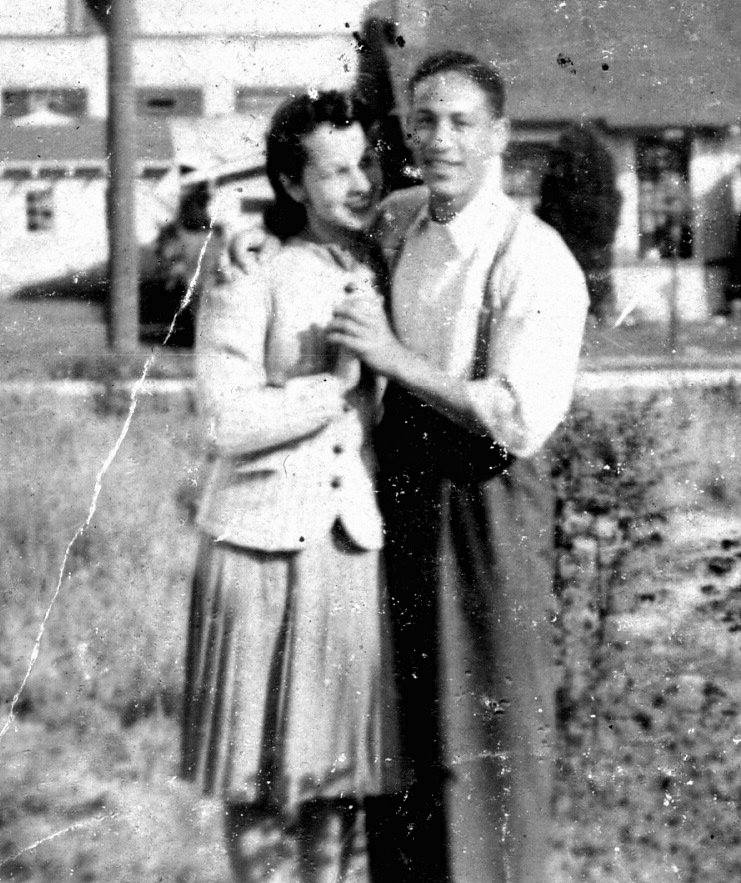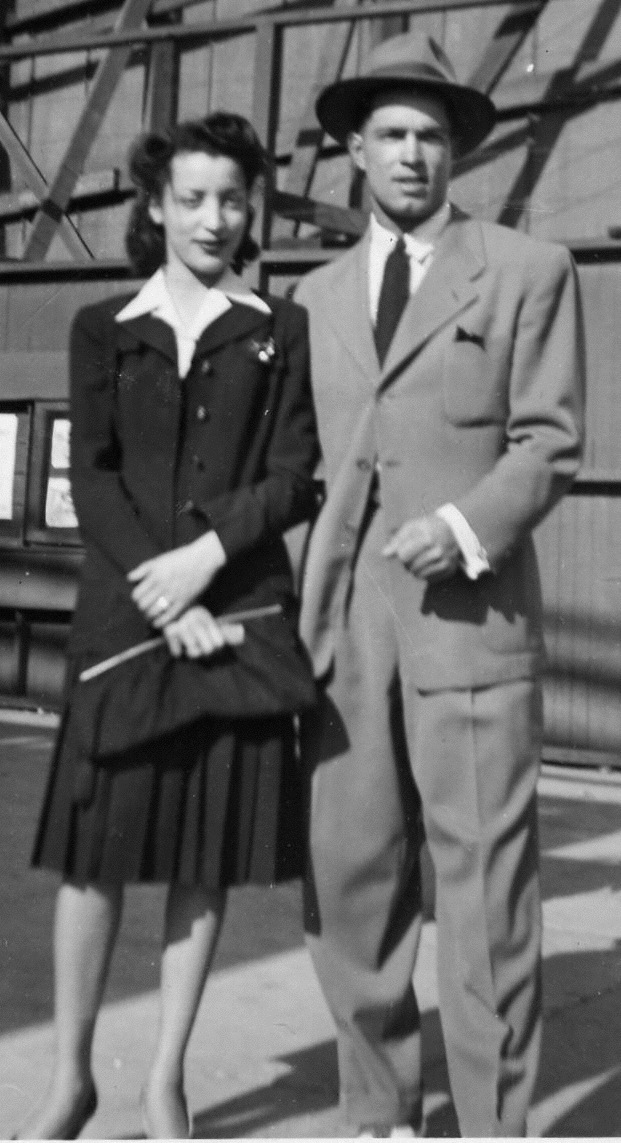
THE UNION(S) OF THE ALLENS AND THE REIDS

Married Couples Maybelle Reid Allen and Ernest Allen (top) And Betty (Allen) Charbonnet Reid And Mel Reid (bottom)

BERKELEY'S REIDS RECORDS,
A PIONEER AFRICAN AMERICAN BUSINESS
Berkeley Tri-City Post
February 18-24 and February 25-March 3, 2009
David Reid is the second-generation owner of Reid’s Records of Berkeley, a pioneer African-American business institution. The Oakland Post sat down with Mr. Reid to talk about the history of his business and the future of African-American business in the East Bay.
BERKELEY POST: Tell us about the history of Reid’s Records.
DAVID REID: Reid’s Records was started in 1945 by my father, Melvin Reid, and my mother, Betty Reid Soskin. I had a host of family members that grew up in the store and also helped my father. My great-uncle, Paul Reid, was one of the integral parts of the store. He was a religious deejay in the store and in the greater Bay Area. Paul would have a radio program, a religious program, and my father had a full service record store. We used to sell gospel music, R&B—well, back in those days, what was called “race music”—jazz. All the genres in the Black Community, we handled all of them. We also did a lot of promoting. So Reids—my parents—were one of the entrepreneurs of their day.
BERKELEY POST: How did the business get started?
DAVID REID: My father was working as a playground director at San Pablo Park while basically they started the store out of the garage next door to the present store. She would basically, with kids, babes in hand, come downstairs and sell the .78’s at that time until my father got off of the recreation department job. The store was a part-time thing that they were trying to establish. Basically from World War II when there was the mass migration of African-Americans into the Bay Area into the shipyards, all of a sudden there was a demand for what they called “race music,” and there was no outlet for it. So that was an opportunity that my father seized on at the time. And so it was like a hobby starting out, but it blossomed into a business, a full, flourishing business. We had stores in Berkeley, we had booths in Swans Market in Oakland. I think he also said for a short time we had stores in Vallejo and Richmond. We had small satellite stores. So it’s something that started out as a part-time occupation but grew into a full-time business.
BERKELEY POST: When did you first start working at the store?
DAVID REID: I started working at the store, I don’t know. I could read record labels before I could read books. I think I was working on Saturdays when I was 7, 8 years old. That’s basically how I grew up, spending my weekends in Berkeley working in the store. Selling .45’s, selling LP’s, doing cleanup work, whatever had to be done. I worked in the store throughout high school. Once I got into college I stopped working in the store and went into construction. I did that for some time before I came back in the early 90’s to take the store over from my mother. So Reid’s Records has been in my blood, and I’m starting my 56th year.
BERKELEY POST: You said that the store started as an R&B store with a gospel component. But at some point, the R&B portion stopped?
DAVID REID: Gospel was probably one of the smaller components of the store originally, though it was an important component. We sold all African-American music. We had Miles Davis, we had James Brown, we had everybody. But in the late 60’s, early 70’s, when the large discount houses started to come into the Bay Area—like Leopold’s and Tower Records and followed by Warehouse—when the more established, mainstream record stores started to get into African-American music and compete with us as far as price-wise, they were selling music cheaper than we could purchase it for. That’s when we basically reformed and specialized in just African-American gospel music. We had the largest selection as far as music and sheet music in the Bay Area. Well it seems like every time, when time goes on, somebody else steps into the mix. Now we have WalMart basically running everybody else out of business, taking over the gospel music industry.
BERKELEY POST: But you’ve still survived through all of this. How have you been able to do that?
DAVID REID: A lot of people are going under. It’s not an easy time for us, either. Most of my clientele, ten years ago, everybody would have been in Richmond, Oakland, San Francisco areas. A lot of my clientele now are back in Modesto, Brentwood, Elk Grove. They are at far distances.
BERKELEY POST: They come all the way to Berkeley?
DAVID REID: They come all the way to Berkeley, but they don’t come with the frequency that they used to.
BERKELEY POST: Are we seeing the almost complete demise of African-American businesses?
DAVID REID: I think it’s changing. I think the Mom & Pop business as a whole is at a demise and its going to go extinct.
BERKELEY POST: Whether its African-American or not?
DAVID REID: Whether it’s African-American or not. But like any other situation, we seem to get hit with the brunt of it, the hardest. We seem to be the ones, when the economy goes down, we seem to really catch hell, instead of other cultures. It seems to have the most impact on us. I think about the times when if I wanted to go eat some soul food, I had all kinds of places to look. You have to dig to really find a restaurant now—an African-American owned restaurant—with African-Americans who actually cook the food, to support. Small Black businesses, the Mom & Pop businesses, are disappearing.
BERKELEY POST: Why is that an important issue?
DAVID REID: A lot of families, a lot of people I know, have grown up with those kinds of jobs, the starter jobs in African-American Mom & Pop businesses. The first one out of high school. But right now, for a lot of these young African-Americans, it’s a lot easier to sell crack, it’s a lot easier to sell marijuana down the street, than it is to have a job. It pays a lot better. So if we don’t have the small Moms & Pops to give these kids jobs, that’s the first line of defense. That’s taking care of our own. You go to the Hispanic community, they have business districts, they have all kinds of community support, social support for their community. You go to the Asian districts, they have all of this, too. Where is the Black district? The only Black districts we have are where you can go purchase drugs. I hate to say it, but, it’s like what the new President says. We have to do something ourselves. Make sure our dollars change hands before they leave our community. Right now, we get paid and our money goes right to the main culture. All our money goes right out. If you trace back the other ethnic groups in the United States, they make sure it passes through a few hands before it leaves their community. But we don’t do that.
BERKELEY POST: What’s the future of Reid’s?
DAVID REID: That’s hard for me to say, because we’ve gone through a metamorphosis a few times. I think we’re accustomed to having to do it again. Because not only do we have the problem of being a small business, technology-wise, we’re also in a cd market which is probably all going to be on your phone in the next year or two. The internet has also taken a toll. So technologically we’re at a disadvantage. We’re probably going to try to still create an atmosphere for the Black Church Experience in robes, in church supplies, in Bibles. I’ve been dabbling lately in promoting. But I’ll always have music, even at the point where it’s not profitable. That’s what we started with, that’s what my parents have done for over 64 years, and I don’t think there’s anybody else that does it better. If you don’t know the exact titles, if you don’t know the exact artists, you cannot get any service at these other places. And that’s one thing we sell is service. You can’t go to WalMart and other stores and get any information, because you don’t have people working at those stores who live and breathe gospel. You don’t have people working at those stores who even listen to the gospel music that you’re trying to get help for. Gospel music is what we do at Reid’s. So over the future, I’m going to try to change our store to meet the needs of people, but it’s hard to see much of a future as far as music-wise and book-wise because of technology. Within ten years, you can probably get everything you want on your phone. Movies. DVDs. Music. Books. I don’t know how we’re going to be able to compete with that. But for those who need help, we will be there.
[NOTE: The Reid's Records Story is included in both branches of our family website—Allens and Reids—because the Record Shop represents one of the several comings-together of those two pioneer Bay Area African-American families. Reid's Records was founded by Mel Reid and was later owned and managed by his former wife, Betty Reid Soskin, an Allen descendant. The record shop is now owned and managed by David Allen Reid, Mel Reid and Betty Reid's Soskin's son, who is descended from both sides of the family.]